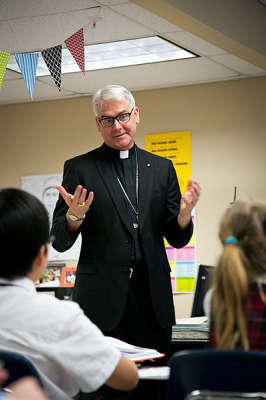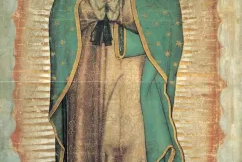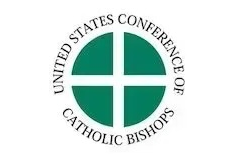US Bishops: This Labour Day is a somber one

Archbishop Coakley - Wiki image
Most Reverend Paul S Coakley Archbishop of Oklahoma City and Chairman of the Committee on Domestic Justice and Human Development United States Conference of Catholic Bishops has issued the following statement for Labour Day.
"Behold, I make all things new" (Rev. 21:5) Rebuilding a Dignified Post-COVID World
This Labour Day is a somber one. The COVID-19 pandemic goes on. Economic circumstances for so many families are stressful or even dire. Anxiety is high. Millions are out of work and wondering how they will pay the bills. And for workers deemed "essential" who continue to work outside the home, there is the heightened danger of exposure to the virus. Yet, as Pope Francis points out in a set of beautiful and challenging reflections on the pandemic, "In this wasteland, the Lord is committed to the regeneration of beauty and rebirth of hope: 'Behold, I am doing something new: right now it is sprouting, don't you see it?' (Is 43:19). God never abandons his people, he is always close to them, especially when pain becomes more present."1 As God declares to John in Revelation: "Behold, I make all things new" (Rev. 21:5). God knows the challenges we face and the loss and grief we feel. The question to us is this: will we pray for and willingly participate in God's work healing the hurt, loss, and injustice that this pandemic has caused and exposed? Will we offer all we can to the Lord to "make all things new?"
As public reports show, the virus has spread widely among essential workers such as meat packers, agricultural workers, healthcare providers, janitors, transit workers, emergency responders, and others. As a result, low wage workers, migrant workers, and workers of colour, have borne a disproportionate share of the costs of the pandemic. Before the pandemic, a significant number of Americans were trapped in low wage jobs, with insecurity around food, housing, and health care, and with little opportunity for savings or advancing in their career. Those same workers have been hit particularly hard, and, it is devastating to say, many have paid with their life. As one New York subway worker put it, "We are not essential. We are sacrificial."2
These words, and the reality behind them, should haunt us. As Pope Francis pointed out at the beginning of his pontificate, "today we also have to say 'thou shalt not' to an economy of exclusion and inequality. Such an economy kills."3 What was wrong before the pandemic has been accelerated now. What may have been hidden to some is now revealed. Against this backdrop, the murder of George Floyd was like lighting a match in a gas-filled room. Pope Francis writes of the pandemic:
We are all frail, all equal, all precious. May we be profoundly shaken by what is happening all around us: the time has come to eliminate inequalities, to heal the injustice that is undermining the health of the entire human family!4
The Holy Father is now using his weekly general audience as an occasion for catechesis on Church teaching on inequalities that have been aggravated by the pandemic.5
The dignity of the human person, made in the image and likeness of God, is not at the centre of our society in the way it should be. In some workplaces, this has meant an emphasis on profits over safety. That is unjust.
Consumerism and individualism fuel pressures on employers and policy makers that lead to these outcomes.
The good news is that injustice does not need to have the last word. The Lord came to free us from sin, including the sins by which we diminish workers and ourselves. "This is the favourable time of the Lord, who is asking us not to conform or content ourselves, let alone justify ourselves with substitutive or palliative logic, which prevents us from sustaining the impact and serious consequences of what we are living."6 Beginning with our own decisions, we might ask when we buy goods from stores of online: do we know where they came from? Do we know whether the people who made them were treated with dignity and respect? Was the workplace made safe during the pandemic, and did workers receive a just wage? If not, what can we do to remedy this?
Our government also plays an indispensable role. Policy makers must address the outstanding needs that people have around nutrition, housing, health care, jobs and income support, as I and my brother bishops have written repeatedly.7 People are hurting, and some of the relief measures of previous legislation are expiring. Congress and the White House should reach a deal that prioritizes protecting the poor and vulnerable.
A sign of great hope springing up at the roots is the Catholic Campaign for Human Development (CCHD), which celebrates its 50th Anniversary this year. Founded to do more than meet emergency needs, CCHD supports low-income-led efforts to address poverty, create good jobs and be a force for transformation in families and communities. Over its history, CCHD has distributed over 8,000 grants worth more than 400 million dollars to help create grassroots change. Pope Francis has made the work of the popular movements that CCHD supports a key theme in his pontificate. In April, he again wrote to the leaders of these groups in light of the pandemic, noting how extraordinarily important these movements are at this very moment.8 Unions and workers' associations have a central role to play as well.
In response to COVID-19, CCHD's community organizations have quickly amplified their efforts to address its devastating impacts.
As one example, workers in meat processing plants are faced with dangerous working conditions as companies fail to provide basic protections from COVID-19 or do not make sufficient workplace modifications to reduce risk of exposure to the virus. The CCHD-supported Rural Community Workers Alliance has helped organize workers in rural Missouri, pressuring employers to take these concerns seriously and advancing the dignity of workers.9 These groups, as well as labor unions and other worker associations, make an invaluable contribution to the safety and wellbeing of workers.
In order to protect the dignity of work and the rights of workers, we are each called to practice solidarity with those in harm's way. In addition, we can offer charitable assistance to all those who have become unemployed during this time by donating to local food banks and Catholic Charities agencies. Catholic Charities helped 13 million people last year, and the demand has increased 30-50% so far during the pandemic and is anticipated to increase. Catholic hospitals are also strained as doctors, nurses, and staff have also been working relentlessly, and have in many instances done so at a loss of significant resources.The dignity of the human person, made in the image and likeness of God, is not at the center of our society in the way it should be. In some workplaces, this has meant an emphasis on profits over safety. That is unjust.
Consumerism and individualism fuel pressures on employers and policy makers that lead to these outcomes. When we buy goods from stores or online: do we know where they came from? Do we know whether the people who made them were treated with dignity and respect? Was the workplace made safe during the pandemic, and did workers receive a just wage? If not, what can we do to remedy this?
Our government also plays an indispensable role. Policy makers must address the outstanding needs that people have around nutrition, housing, health care, jobs and income support, as I and my brother bishops have written repeatedly.7 People are hurting, and some of the relief measures of previous legislation are expiring. Congress and the White House should reach a deal that prioritizes protecting the poor and vulnerable.
A sign of great hope springing up at the roots is the Catholic Campaign for Human Development (CCHD), which celebrates its 50th Anniversary this year. Founded to do more than meet emergency needs, CCHD supports low-income-led efforts to address poverty, create good jobs and be a force for transformation in families and communities. Over its history, CCHD has distributed over 8,000 grants worth more than 400 million dollars to help create grassroots change. Pope Francis has made the work of the popular movements that CCHD supports a key theme in his pontificate. In April, he again wrote to the leaders of these groups in light of the pandemic, noting how extraordinarily important these movements are at this very moment.8 Unions and workers' associations have a central role to play as well.
In response to COVID-19, CCHD's community organizations have quickly amplified their efforts to address its devastating impacts. As one example, workers in meat processing plants are faced with dangerous working conditions as companies fail to provide basic protections from COVID-19 or do not make sufficient workplace modifications to reduce risk of exposure to the virus. The CCHD-supported Rural Community Workers Alliance has helped organize workers in rural Missouri, pressuring employers to take these concerns seriously and advancing the dignity of workers.9 These groups, as well as labor unions and other worker associations, make an invaluable contribution to the safety and wellbeing of workers.
In order to protect the dignity of work and the rights of workers, we are each called to practice solidarity with those in harm's way. In addition, we can offer charitable assistance to all those who have become unemployed during this time by donating to local food banks and Catholic Charities agencies. Catholic Charities helped 13 million people last year, and the demand has increased 30-50% so far during the pandemic and is anticipated to increase. Catholic hospitals are also strained as doctors, nurses, and staff have also been working relentlessly, and have in many instances done sop at a loss of significant resources.
Pope Francis is fond of citing the 1964 dogmatic constitution, Lumen Gentium, which reminded us that "no one can save themselves alone."10 This is true in this life and the next. The fruits of individualism are clear in the disparities brought to light by this crisis. Through our work of solidarity, let us be a counter-witness to individualism. "Let us not think only of our interests, our vested interests. Let us welcome this time of trial as an opportunity to prepare for our collective future, a future for all without discarding anyone."11 Let us pray for the grace to participate in God's work in healing what is so deeply wounded in our society. Let our response to the Psalm at Mass this Labor Day echo in deed and truth: "Lead me in your justice, Lord" (Ps 5:9). .....
NOTES
1 Pope Francis, Life After the Pandemic (2020), 46. www.vaticannews.va/content/dam/lev/la-vita-dopo-la- pandemia/pdf/INGLESE_11_05.pdf (hereinafter Life After the Pandemic).
2 Sujatha Gidla, "'We Are Not Essential. We Are Sacrificial.'" The New York Times (May 5, 2020). www.nytimes.com/2020/05/05/opinion/coronavirus-nyc-subway.html
3 Pope Francis, Evangelii Gaudium, no. 53. www.vatican.va/content/francesco/en/apost_exhortations/documents/papa- francesco_esortazione-ap_20131124_evangelii-gaudium.html
4 Life After the Pandemic, 52.
5 See, e.g., Pope Francis, "General Audience" (Aug. 26, 2020). www.vatican.va/content/francesco/en/audiences/2020/documents/papa-francesco_20200826_udienza-generale.html.
6 Life After the Pandemic, 47.
7 www.usccb.org/news/2020/us-bishops-chairman-domestic-justice-and-human-development-urges-care-poor-and-vulnerable 8 Pope Francis, Letter to the Popular Movements (April 12, 2020). www.vatican.va/content/francesco/en/letters/2020/documents/papa-francesco_20200412_lettera-movimentipopolari.html
8 Pope Francis, Letter to the Popular Movements (April 12, 2020). www.vatican.va/content/francesco/en/letters/2020/documents/papa-francesco_20200412_lettera-movimentipopolari.html
9 Noam Scheiber et al., "Missouri Pork Plant Workers Say They Can't Cover Mouths to Cough," The New York Times (April 24, 2020). www.nytimes.com/2020/04/24/business/economy/coronavirus-smithfield-meat.html#:~:text=the%20main%20story- ,Missouri%20Pork%20Plant%20Workers%20Say%20They%20Can't%20Cover%20Mouths,protect%20workers%20from%20coronavirus%20infection.
10 Life After the Pandemic, 35; cf. id. at 21, 46; see also Lumen Gentium, no. 9 ("God . . . does not make men holy and save them merely as individuals, without bond or link between one another. Rather has it pleased Him to bring men together as one people . . ."). www.vatican.va/archive/hist_councils/ii_vatican_council/documents/vat-ii_const_19641121_lumen-gentium_en.html
11 Life After the Pandemic, 53.


















